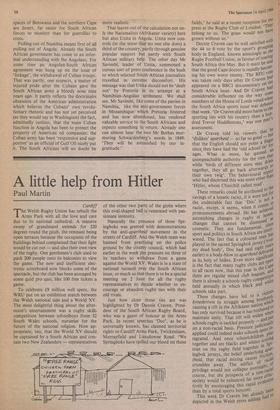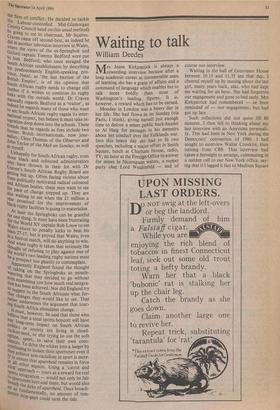A little help from Hitler
Paul Martin
Cardiff The Welsh Rugby Union has rebuilt the Arms Park with all the love and care due to its national cathedral. A massive sweep of grandstand extends for 320 degrees round the pitch, the remnant being open terraces because the occupants of the buildings behind complained that their light would be cut out — and also their own view of the rugby. One gentlemen's club used to pack 200 people onto its balconies to view the game. The new and inefficient elec- tronic scoreboard now blocks some of the spectacle, but the club has been assuaged by some quid pro quo, like 100 free tickets a game.
To celebrate £9 million well spent, the WRU put on an exhibition match between the Welsh national side and a World XV. The most delightful thing about the after- noon's entertainment was a rugby skills competition between schoolboys from 32 South Wales schools, nurseries for the future of the national religion. How ap- propriate, too, that the World XV should be captained by a South African and con- tain two New Zealanders — representatives of the other two parts of the globe where this oval-shaped ball is venerated with pas- sionate intensity.
Naturally the presence of three Spr- ingboks was greeted with demonstrations by the anti-apartheid movement in the streets of Cardiff. And the Welsh team was banned from practising on the police ground by the county council, which had earlier in the week put pressure on three of its teachers to withdraw from a game against the World XV. Wales is in a state of national turmoil over the South African issue, so much so that there is to be a special meeting on 2 June for all the rugby representatives to decide whether to en- courage or abandon rugby ties with their old rivals.
Just how close those ties are was highlighted by Dr Dannie Craven, Presi- dent of the South African Rugby Board, who was a guest of honour at the Arms Park. In recent speeches 'Doc', as he is universally known, has claimed territorial rights to Cardiff Arms Park, Twickenham, Murrayfield and Lansdowne Road. 'We Springboks have spilled our blood on those
The Spectator 14 April 1984 fields,' he said at a recent reception for the press at the Rugby Club of London. `They belong to us. The grass would not have grown without us.' Doctor Craven can be well satisfied with the 44 to 6 vote by the sport's grouping body in England, known amusingly as the Rugby Football Union, in favour of touring South Africa this May. But it must be said that the good Cape doctor is rapidly becom- ing his own worst enemy. The RFU vote was taken only days after Dr Craven had appeared on a BBC1 documentary on the South Africa issue. And Dr Craven ha considerable influence on the way some members of the House of Lords voted when the South Africa sports issue was debate' that week. `Dr Craven did more harm to the sporting ties with his country than a hull: dred Trevor Huddlestons,' was one Peer'' assessment. Dr Craven told his viewers that he 'dislikes' apartheid — so far so good — but that the English should not point a tinge' since, they have had the 'old school tie f°r ages. What is more, he quoted all unimpeachable authority for the view,th)! while 'birds of different sorts may or":„, together, they all go back afterwards together, they own twig'. The behavioural exPer.1 who had discerned this was none other tha' 'Hitler, whom Churchill called mad'•
These remarks could be attributed to {or
ravings of a lunatic racist, if it were no a the undeniable fact that 'Doc' is 11°t racist, except, it seems, when it collies to pronouncements abroad. He has achiev
e
astonishing changes in rugby at born; changes that cannot be dismissed a e cosmetic. They are fundamental, shic sport and politics in South Africa are intehrta; wined. The fact that a coloured man over played in the sacred Springbok jersey (°' rs my dead body', Doc had said eight Yea „.,1 earler) is a body-blow to apartheid deliver'nf in its holy of holies. Even more signifiea is the fact that many rugby clubs are °Pe to all races now, that this year in the call there are regular mixed club leagues, a.°00 there is already a schools rugby comPetlt,ilte held annually in which black and '"'" schools take part.
These changes have led toions
a vicious broedertwis (a struggle among brothe,r,sc)ll causing a rift in the Afrikaner nation Bred has only survived because it has bothered. he maintain unity. That rift will widen vid ticut schools rugby is tackled properly — Pah,. on a non-racial basis. Pressure judieioll,„, applied could indeed make schools sP°rt lay tegrated. And once schoolchildren together and see blacks and whites 50,17 tries on the rugby field together inar ingbok jerseys, the belief underlying theid, that racial mixing causes frictI;i crumbles away. 'The edifice of ra of privilege would not collapse overnighta'cial course, but the prospects of a nol-r,fec. society would be enhanced far more el ti_„ tively by encouraging this rapid
than by a total sports boycott. beell
This week Dr Craven has alreadY 0
fuel depicted in the Welsh press adding evolu
the fires of conflict. He decided to tackle the Labour-controlled Mid-Glamorgan Count- y Council head on (his usual method) by going to see its chairman, Mr Squires. Craven came off second-best, as indeed he did in another television interview in Wales, Where the views of the ex-Springbok and Oxford captain Tommy Bedford were put to him. Bedford, who once enraged the South African establishment by describing his Predominantly English-speaking pro- vince, Natal, as 'the last bastion of the British Empire', is of the opinion that South African rugby needs to change still further if it wishes to continue its rugby links with the outside world. Dr Craven naturally regards Bedford as a 'traitor', as indeed he regards many of those who want to see South African rugby regain its inter- national respect, but believe it must take in- tegration deep down into the schools. These friends that he regards as foes include two former Welsh internationals, now jour- nalists, Clem Thomas of the Observer and John Taylor of the Mail on Sunday, as well as myself. Unhappily for South African rugby, even those black and coloured administrators Who have thrown in their lot with Dr Craven's South African Rugby Board are getting fed up. Often facing vicious abuse from politically motivated radical coloured and African bodies, these men want to see the Pace of change stepped up. They are also waiting to see when the £1 million a black promised for the improvement of
ck rugby facilities is going to materialise.
fAt least the Springboks can be grateful or one thing. It must have been frustrating for the World XV captain Rob Louw to see Wales resort to penalty kicks to beat his team 27-17, but it proved that Wales, even bAin a festival match, will do anything to win. nd when rugby is taken that seriously the „,t3ught of refusing to play against one of oo world's two leading rugby nations must ue a prospect too ghastly to contemplate. Apparently England found the thought' Of taking on the Springboks so mouth- ntering that they decided to go without `,"`en examining just how much real integra- tuon has been achieved. Nor did England try 6? suggest to the South Africans what fur- 'net changes they would like to see. That lather undermines the argument that tour- ng South Africa stimulates change. eliIt must, however, be said that those who eVe that a total sports boycott will have ?1°11g-term impact on South African olitics or society are living in cloud- oglekoo-land, or else trying to use the soft 2tion, sport, to salve their own cons- '!ences. To drive the whites into a laager by they to isolate their sportsmen even if it.neY achieve non-racialism in sport is mere- (II to ensure that apartheid remains in force
other aspects. Using a 'carrot and
sti all „Port approach — tours as a reward for real oPr o„Ports rt siutmegernation — would not only be fair here and there, but would also e°.eaeli the dyke of apartheid. Once breach- fundamentally, no amount of tem- arY stoP-gaps could stem the tide.











































 Previous page
Previous page